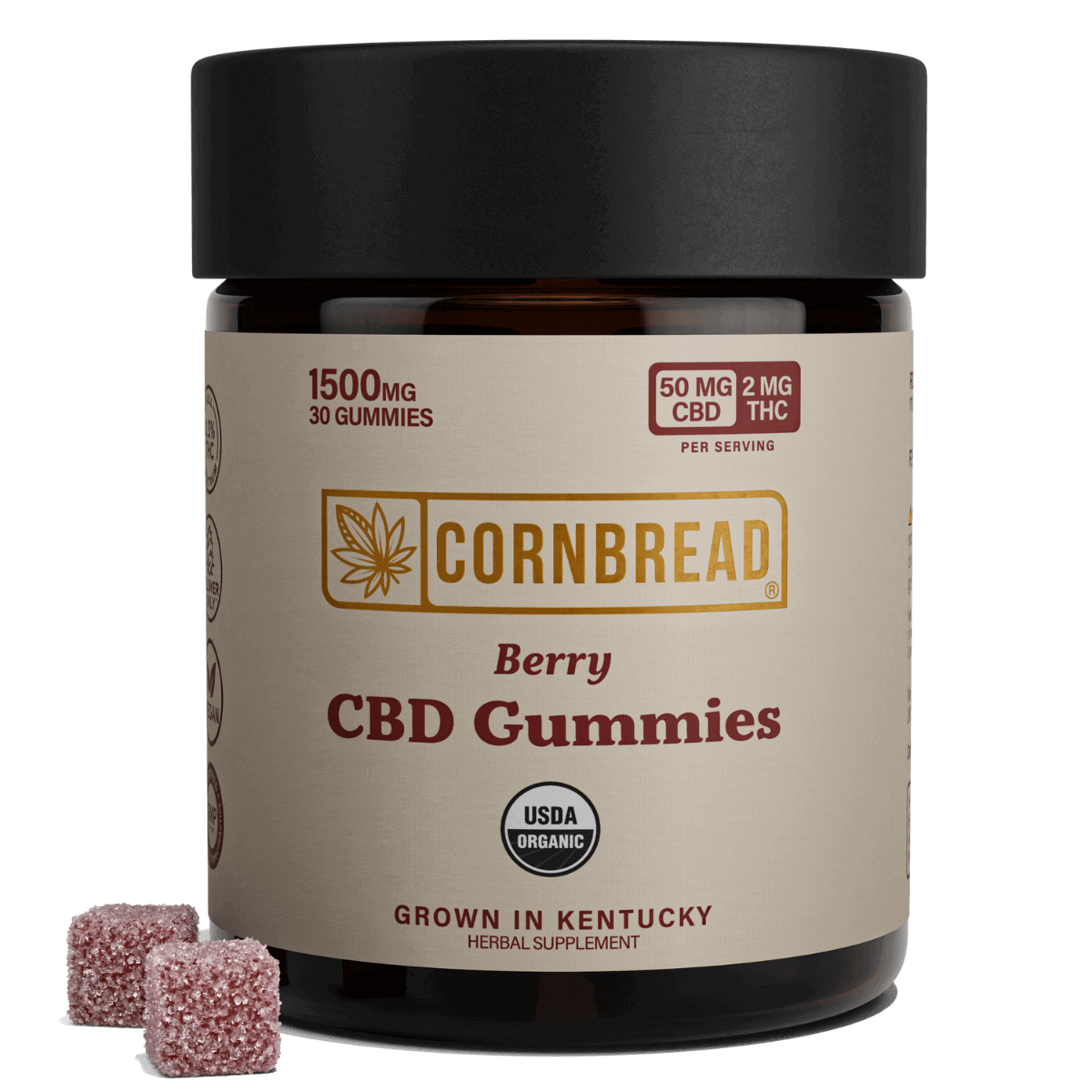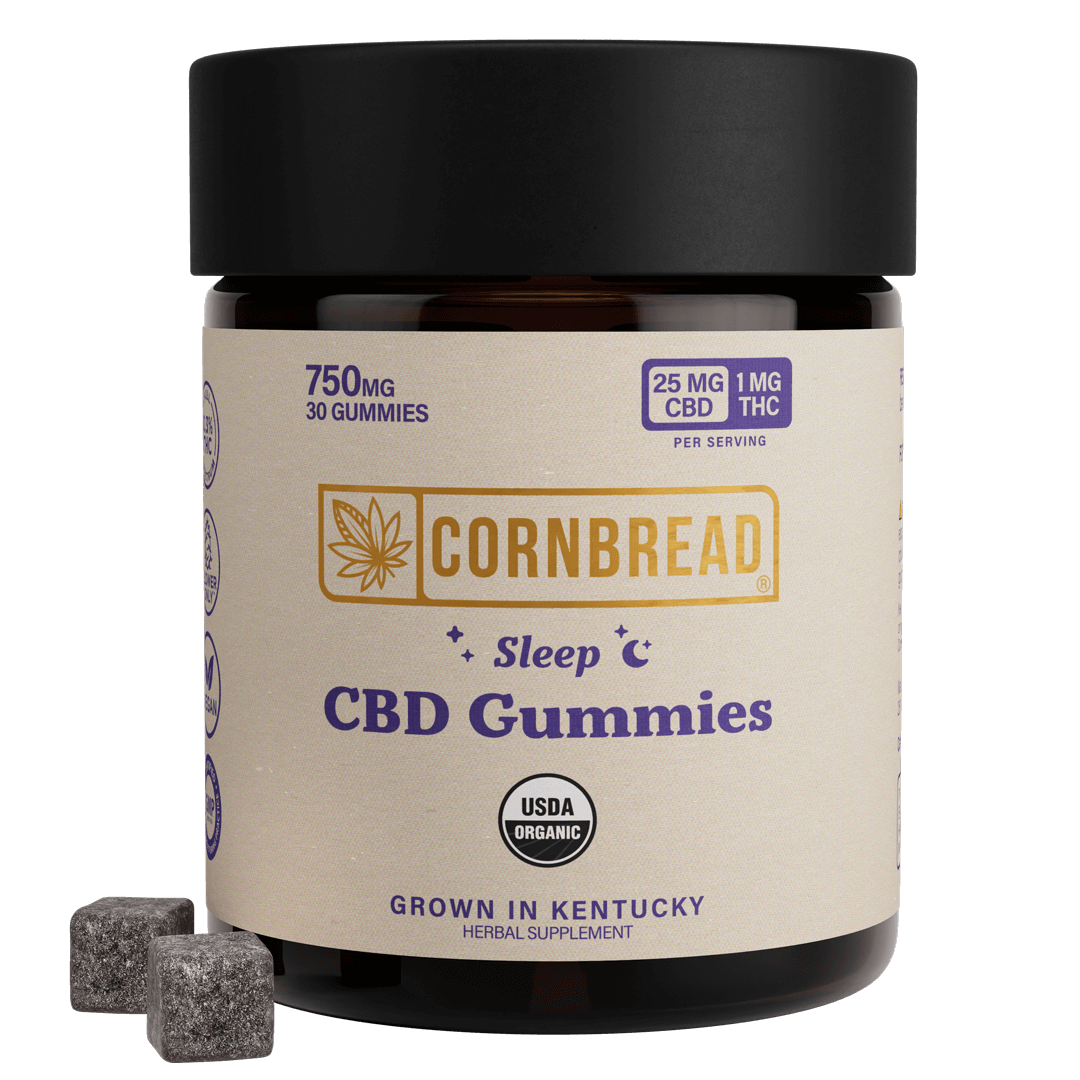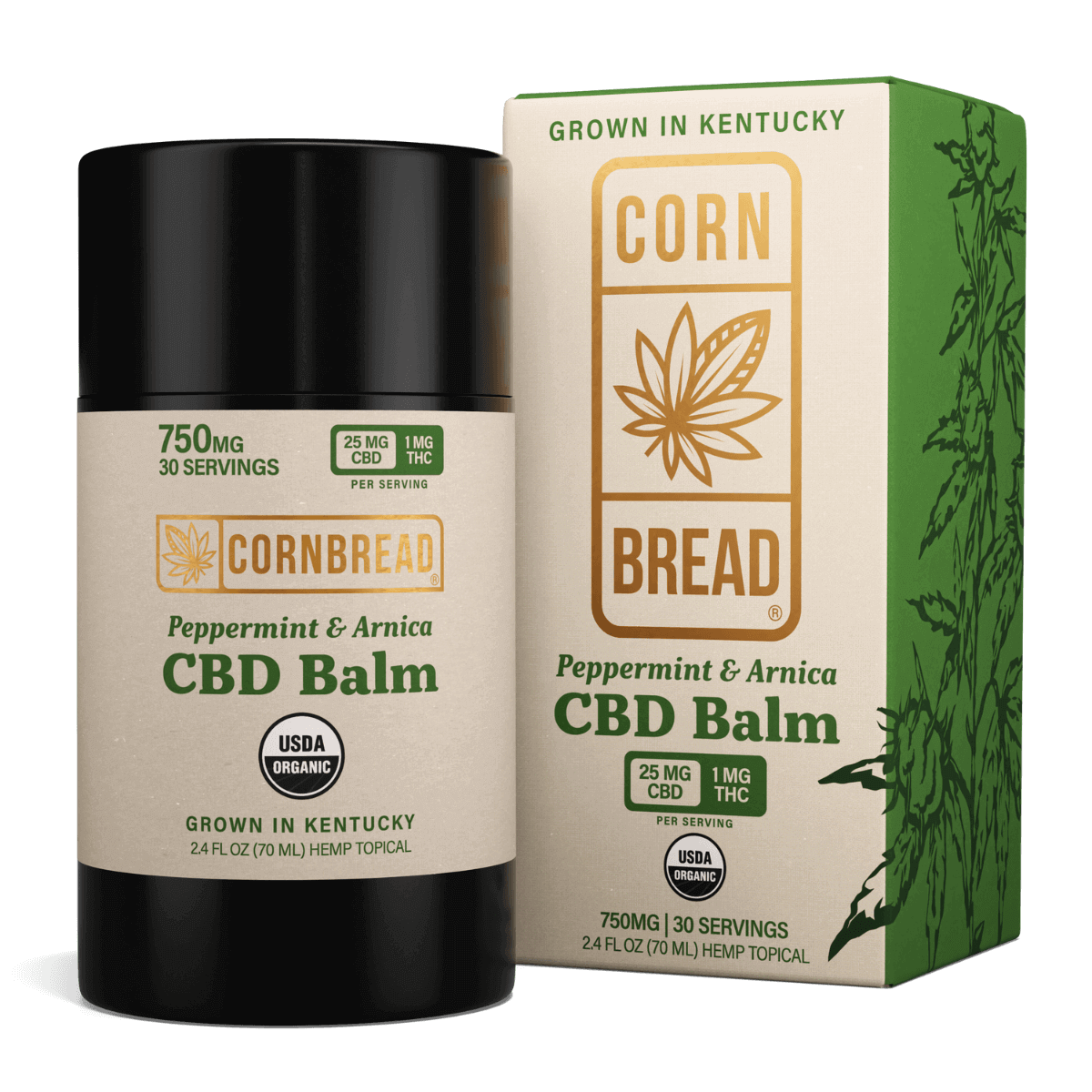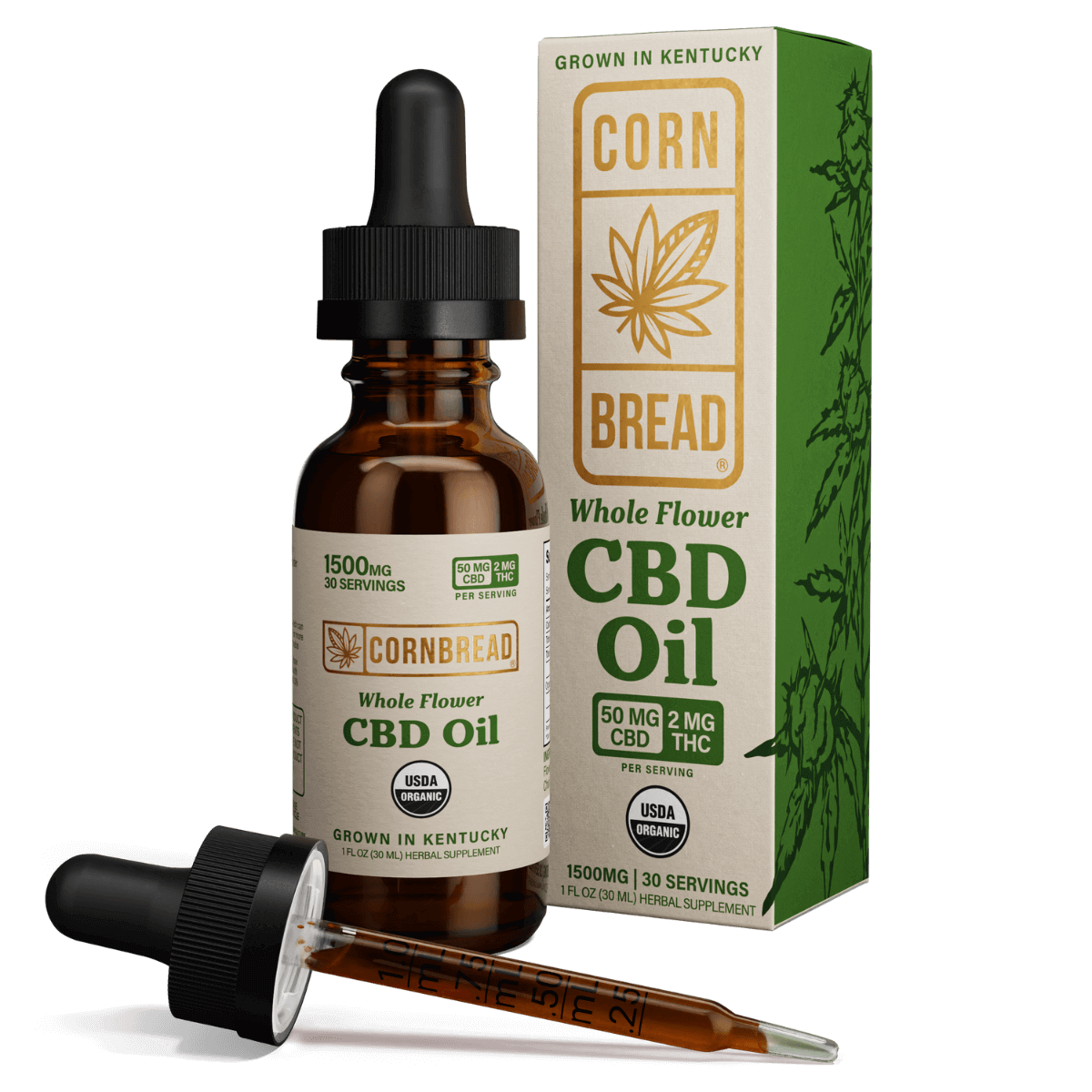Table of Contents
Introduction
Thanks to their potential therapeutic benefits, CBD gummies are swiftly gaining popularity among wellness-minded consumers. For some people, CBD gummies are even more appealing than CBD oil because they’re easier to dose and taste like treats.
While CBD gummies are generally well tolerated and considered safe to use, just as with any supplement, it’s important to be aware of any potential negative side effects.
In this article, we'll discuss these possible negative side effects of CBD gummies as well as their potential benefits. We’ll also offer some tips on how to incorporate CBD gummies into your wellness routine safely.
What Is CBD?
Cannabidiol (CBD) is a compound derived from hemp, a form of the cannabis sativa plant. In addition to CBD, hemp contains over 150 other cannabis compounds (called cannabinoids), including a small amount of THC (tetrahydrocannabinol).
In 2018, the cultivation of industrial hemp was made legal on a federal level, resulting in a surge of new CBD products. According to a recent Healthline survey1 of over 7,000 Americans, 25% of participants were either already using CBD products or were interested in using CBD.
Potential Benefits of CBD Gummies

The human body has what’s called an “endocannabinoid system,” or ECS for short. ECS receptors are located throughout the body, and they interact with cannabinoids and endocannabinoids (those produced within the body) to influence various other systems and vital functions.
The fact that ECS receptors can interact with CBD and are present in nearly every system of the human body may help to explain why CBD seems to make such a noticeable difference in supporting general wellness. The apparent benefits brought about by CBD include:
-
Better sleep and relief from occasional sleepless nights
-
Relief from aches and pains (particularly those associated with exercise-induced inflammation)
-
Reduction in everyday stress
-
Improved mood
The interest in CBD continues to grow, and there have been clinical trials seeking to discover CBD's effects and potential benefits2 with regard to other conditions as well.
Negative Side Effects of CBD Gummies
The World Health Organization (WHO) stated that across several clinical trials, CBD was found to be well-tolerated with a good safety profile.3 Side effects from CBD gummies are relatively uncommon. It is possible that some consumers will experience the negative side effects of CBD gummies, though, so it’s important to be aware of what those may be.
You may have heard rumors that CBD edibles can be psychoactive or that CBD gummies' side effects are dangerous, but you can rest assured this isn’t true — most side effects from CBD gummies are relatively tame.
So, what are the negative side effects of CBD gummies? Possible side effects include:
1. Dry Mouth
Dry mouth (xerostomia) is used to describe a dryness of the mouth due to changes in the saliva composition or the flow of saliva. It’s a common side effect of medications, and the connection between CBD and dry mouth is well known.4
According to research from 2022,5 one of the salivary glands in the mouth has cannabinoid receptors, and its function can be affected by cannabinoids or endocannabinoids. It’s been suggested that CBD doesn’t directly alter saliva production.6 However, it may instead affect other cannabinoids and endocannabinoids,7 which, in turn, cause mouth dryness.
This side effect seems to be more common in those who smoke CBD as opposed to those who take oral CBD (like CBD gummies). Still, any CBD product can bring about dry mouth.
While this isn’t a serious side effect, it can be uncomfortable. Drinking plenty of water and avoiding caffeine, tobacco, and alcohol can help alleviate dry mouth.
2. Drowsiness
Another side effect of CBD gummies is drowsiness. CBD has a calming effect on the body, which can make you feel sleepy or drowsy. While this can be helpful for people with trouble sleeping, it can be an unwanted side effect for those who need to stay alert and focused. For this reason, it may be better to take CBD gummies at the end of the day rather than in the morning.
3. Nausea
Nausea is another potential side effect of CBD gummies. CBD can interact with the digestive system, leading to nausea and vomiting. This side effect is associated with people who consume higher doses of CBD. It’s important to start with the recommended dose when taking CBD. If you experience nausea after consuming CBD gummies, it's best to stop using them and talk to your doctor.
4. Diarrhea
Some consumers may experience diarrhea after cannabidiol gummy ingestion. CBD interacts with ECS receptors in the gastrointestinal tract and may be too stimulating, especially when consumed in high doses or by those with a sensitive gut. It’s also possible that another ingredient in the gummies, and not the CBD itself, is the problem. If you experience diarrhea after consuming CBD gummies, reducing your dose or stopping taking them altogether is best.
5. Changes in Appetite
CBD has the potential to affect appetite — one way or the other. A report from 20228 discussed 11 trials in which the majority reported that CBD caused reduced appetite and/or weight loss, one observed increased appetite, and the others found no significant changes. The writers expressed concern for the risk of bias within the trials and suggested that more research should be done on the subject.
6. Mood Changes
CBD can also have an impact on mood, which in fact is one of the reasons why so many consumers gravitate toward this supplement. While most people tend to experience a calming effect, there have been reports of feeling anxious or irritable after consuming CBD.
7. Reduced Blood Pressure
A study from 20179 noted that a single dose of CBD caused reduced blood pressure in healthy individuals. If you’re taking blood pressure medication or other medications that can affect your blood pressure, it’s important to speak with your doctor before taking CBD gummies or other CBD supplements.
8. Lightheadedness
CBD can cause lightheadedness or dizziness, especially when consumed in high doses. This side effect may be related to the one above, as it’s more common in people who have low blood pressure. If you experience lightheadedness after consuming CBD gummies, it's best to reduce your dose or stop using them altogether. If you’re currently taking medications to control your blood pressure, stop taking CBD and speak with your doctor.
9. Liver Damage
There have been reports of CBD causing liver test abnormalities, and the FDA lists liver damage as a potential side effect of CBD use. Although these studies were performed in mice with huge doses of CBD, which aren’t comparable to supplement doses of CBD found in gummies, it’s important for consumers to be aware of this risk.
10. Failed Drug Tests
Hemp-derived CBD products (including gummies) are legal in most states as long as they contain no more than 0.3% THC. Even though that amount of THC is very low and wouldn’t cause a person to feel “high” (like medical cannabis would), it’s still enough to possibly trigger a positive drug test result.
Even CBD gummies that claim to be free from THC could be contaminated with THC during production, and, in some cases, unscrupulous companies use misleading or altogether false labeling on their CBD products.
Procuring your CBD gummies from a reputable company is extremely important. Look for companies that utilize third-party testing to confirm the exact cannabinoid content of their products. They should also make certificates of analysis (COAs) available to their customers. These detail the results of third-party testing.
If you’re subject to drug testing, you can get a written note from your doctor that explains your medical need to use CBD products, that it won’t affect your ability to perform your duties, and that it could result in a positive drug test. Take this to your HR (human resources) department and see if they’ll also put something in writing that may protect you from a positive drug test result.
10. Heavy Metal Toxicity
The hemp plant is a bio-accumulator, meaning it absorbs contaminants such as heavy metals and pesticides from the soil faster than it can release them. This makes hemp very useful in phytoremediation (the use of plants to decontaminate environments) but raises red flags for CBD consumers.10
The CBD industry is relatively new and underregulated. Due to hemp’s natural uptake of toxins from the earth, it’s very important for it to be grown organically in clean, healthy soil. Manufacturers who grow their hemp outside of the organic agricultural guidelines11 may ultimately produce CBD gummies and oils that are contaminated with heavy metals and other toxins. These contaminants are then passed onto the consumers, who may experience various adverse health effects as a result. This is why it’s important to check the COA lab reports for any CBD product to ensure they test for heavy metals and that those tests are negative.
11. Prescription Drug interactions
CBD has been reported to interact with various types of medications, including antidepressants, epileptic drugs, benzodiazepines (sedatives), and opioid analgesics (pain relievers). It also appears to interact with other drugs that are more commonly used, such as alcohol and acetaminophen. Below are some of the reported interactions between CBD and other medications12 and substances:
Anti-epileptic drugs
Depending on which anti-epileptic drug is taken with CBD, any of the following may occur:
-
The level or effect of CBD will be decreased.
-
The level or effect of the anti-epileptic drug will be increased.
-
The level or effect of CBD will be decreased and the level or effect of the anti-epileptic drug will be increased.
Opioids
CBD will increase the effect or level of opioids, such as morphine, when taken concurrently.
Benzodiazepines
Depending on the specific benzodiazepine being taken in conjunction with CBD, the following may occur:
-
CBD will reduce the anticonvulsant effects of the drug.
-
CBD will increase the level or effect of the drug
-
CBD will increase the drug’s plasma concentrations.
Tricyclic Antidepressants
Depending on the specific tricyclic antidepressant taken with CBD, the following may occur:
-
The level or effect of CBD increase.
-
The level or effect of the antidepressant will increase.
Alcohol
CBD’s interactions with alcohol aren’t well understood, but it’s known to act on a particular type of serotonin receptor, which may be causally related to the addictive effects of alcohol use.13
Acetaminophen
According to a 2019 animal study, it was observed that test subjects who were given specific doses of CBD for three days in a row, followed by a dose of acetaminophen on the fourth day, experienced an increased risk of severe liver damage and mortality.16
Is CBD to Blame?
There have been several theories as to what specifically causes the negative side effects of CBD gummies and other hemp-derived CBD products:
1. Cannabidiol (CBD) Itself
The first theory is that it is the CBD compound itself that’s producing unwanted negative effects.
2. Degradation of CBD into Delta-9 THC
The second theory hypothesizes that CBD may degrade into Delta-9 THC in the stomach, a notably acidic environment. This would mean that THC is the actual cause of the negative side effects.
3. Delta-9 THC in CBD Products
The final theory suggests that hemp-derived CBD products could be contaminated by Delta-9 THC during the extraction and/or production processes and that (as in the second theory) the Delta-9 THC is the catalyst for the negative side effects.
According to a 2019 study,17 this third theory appears the most likely, and the adverse effects of some CBD supplements may actually result from low-dose Delta-9 THC contamination.
Could Other Contaminants Be the Cause?
As we mentioned earlier, CBD gummies can potentially contain contaminants, such as pesticides and heavy metals, due to unscrupulous growing practices. It’s possible that some of the negative side effects of CBD gummies are actually the result of these contaminants, at least for some consumers.
How to Avoid Negative Side Effects of CBD Gummies
While the negative side effects of CBD gummies aren’t common for most consumers, they’re still a possibility. Fortunately, there are things you can do to avoid the side effects of CBD or at least to reduce your chances of experiencing them.
Only Use Organic CBD Gummies
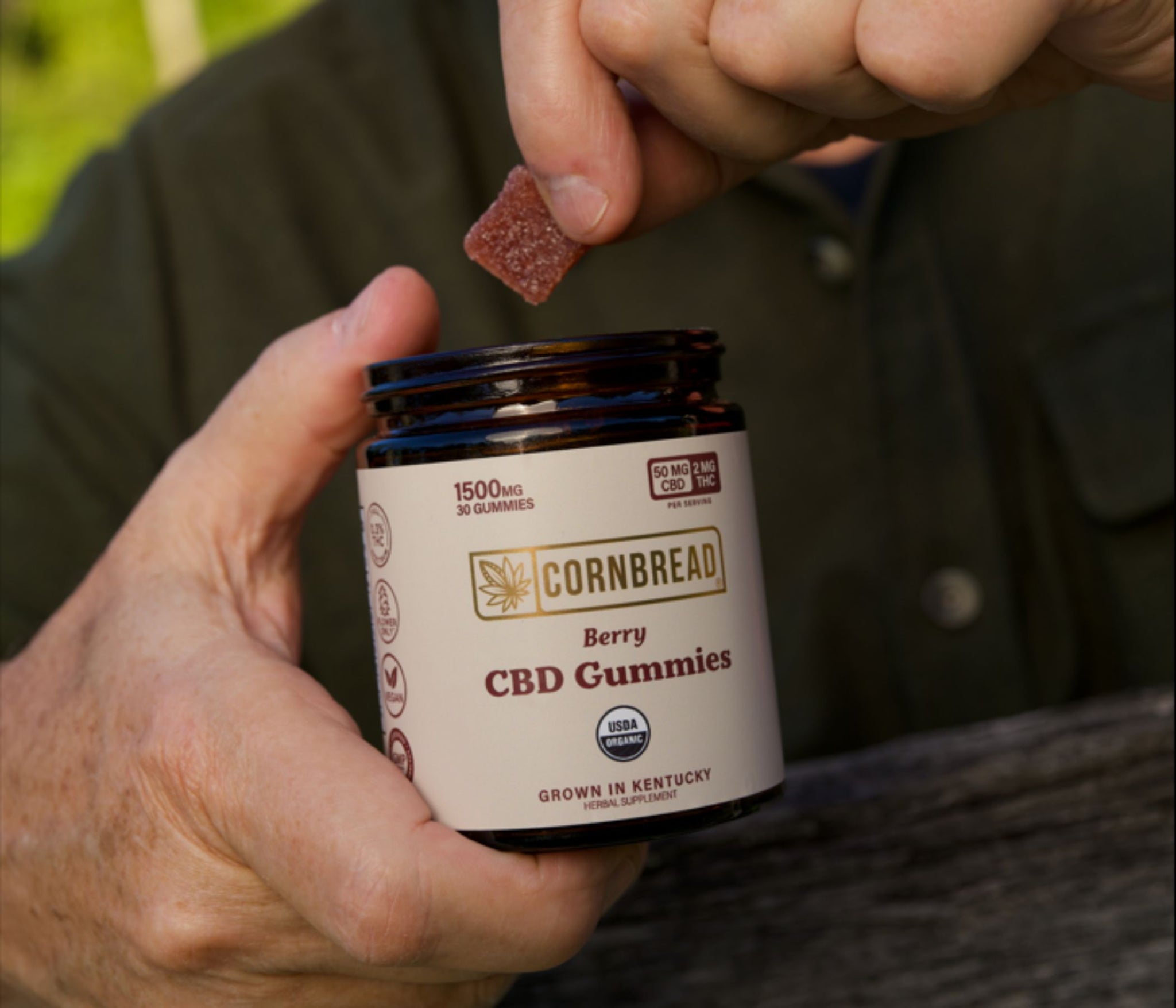
Using non-organic CBD gummies opens you up to the risk of exposure to heavy metals, pesticides, and other contaminants. All of these can increase your risk of experiencing negative side effects from CBD gummies.
Only Purchase Cannabidiol Extracts Sold Online From a Reputable Source
Due to a lack of regulation, some companies get away with selling CBD oils, extracts, and gummies with misleading or inaccurate labeling and questionable ingredients. By only purchasing CBD gummies from a trusted source that uses third-party lab tests and makes the results available to its customers, you can reduce your risk of experiencing adverse side effects.
Companies that offer high-quality CBD gummies with ingredients you can trust will always use third-party testing and provide COAs on their websites for customers to access.
Follow Usage Guidelines
As exciting as starting a CBD gummy regimen can be, it’s important to limit your CBD dosage to what’s recommended by the manufacturer (or less). Many of the negative side effects of CBD gummies were most often observed in individuals who were taking a very high CBD dosage.
Take It Slow
It can take up to two weeks, or even longer, for some people to experience the desired beneficial effects of CBD. When starting a CBD gummies regimen, it’s important to stick to the recommended starting dose for two to three weeks before increasing to higher doses. Taking too much too soon could result in adverse reactions.
Listen to Your Body
It’s possible that even the recommended starting dose will be too much for some people. Reduce your CBD dose if you feel uncomfortable or notice any adverse reactions — you may be able to increase the dose in the future, but always pay attention your body and don’t hesitate to lower your dose or discontinue CBD use if you experience uncomfortable reactions.
Listen to Your Healthcare Provider
It’s always a good idea to speak with your healthcare provider before starting a new supplement, even one as natural and generally well-tolerated as CBD. If you have other conditions or are taking other medications, speak with your doctor before beginning a CBD regimen.
Cornbread Hemp CBD Gummies

While CBD gummies are generally considered safe, they can have side effects, especially when consumed in high doses or alongside certain medications. You can reduce your risk of negative side effects by limiting the CBD gummies you take to the recommended dose, taking high-quality organic CBD gummies, and purchasing them from a reputable source.
Cornbread Hemp CBD Gummies are made with only the highest quality ingredients. The CBD extract used in our gummies is derived from the flower only and contains the full spectrum of cannabinoids present in hemp, offering maximum potential benefits.
Like all our CBD products, our CBD gummies are USDA-certified organic through every step of the process. To ensure that our customers get exactly what we promise, Cornbread Hemp utilizes third-party lab tests to verify the quantity of all cannabinoids in our CBD products. The certificates of analysis (COAs) are available on our website. Shop our full-spectrum CBD gummies now.










 Log in
Log in
















